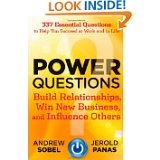By Stephen Tweed
Yesterday morning I was up early to be ready for a live web conference at 8:00 am. My wife and business partner, Elizabeth, is coaching the CEO of a large and well know Christian Ministry, and the group was having a web conference with the author of a new book.
Andrew Sobel is the co-author, along with Jerold Panas, of the book, Power Questions: Build Relationships, Win New Business, and Influence Others. When Elizabeth showed me the book, and invited me to listen in on the web conference, I jumped at the chance because I just knew there would be some pearls of wisdom for you … my cherished readers.
If you’ve been in any of my sales training sessions or listened in on our live web conferences on
home care sales, you know what importance we place on questions.
Well, I was right. Andrew Sobel did have some gems for us. I’ll be sharing may of them over the coming months in new blog posts, but let me begin with some insights from chapter 4, “When the Sale is Stuck.” Many of you face challenges in getting traction with new referral sources, and the sale often gets stuck.
The question that Sobel and Panas ask when the sale is stuck is, “Are they ready to buy?” You’ve heard that before. “We talk and talk but nothing happens. They don’t get off the stick and buy.”
I’m sure you ‘ve faced that issue. You identify a person whom you believe has great potential to refer new clients to you. You make half a dozen sales calls. The person is kind and seems to like you. You feel like you have a good relationship, and the person promises to pass your information along to any clients who might need your services. Yet nothing happens. Here are four questions that Sobel and Panas ask you to consider with the sale is stuck:
1. Is there a problem or an opportunity? When you are calling on a new referral source, you have to find out whether there is a need for your services. If there is no urgent problem that needs a solution, the prospect will be polite and smile and tell you how much they like you, but you don’t get referrals.
2. Does the person “own” the problem? When you are calling on a new person, you need to make sure you are talking to the right person, and that this is the person who “owns” the problem.
3. Does the buyer have a healthy dissatisfaction with the current offering? If the person you are meeting with already has a very positive relationship with another home care company and they are satisfied with the results they are getting, there’s no need to change.
4. Does the buyer trust you and believe you’re the best alternative they have? Wow! What a question. How do you know when the referral source trusts you and likes you enough to switch.
To find out the answers to these four power questions, here is a series of questions that I suggest you use to open the conversation and assess the potential:
- “Tell me about your business.” (I know, that’s a statement, not a question)
- “How often do you have the opportunity to suggest home care services to an elderly or disabled person?”
- “What home care companies do you now use?”
- “What do you like about working with them?”
- “What you wish they would do differently?”
By asking these five simple questions, you will engage the prospect and learn about the opportunity. The you can assess whether it is worth taking this further and making additional sales calls.
To learn more about using questions in all aspects of your business, order a copy of Power Questions today on Amazon.com.
To learn more about asking questions in selling private duty home care, join me for one of our upcoming live workshops, “Serving More Clients.”





